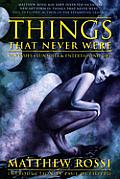While I wouldn't go as far as Paul di Filippo in declaring Things That Never Were to be an entirely new artform (the introduction is rather over the top), it certainly is difficult to classify. It is fiction, in that it takes ideas or various bits of history and spins stories, possibilities, and bizarre explanations for them. On the other hand, it's a pure exploration of ideas without plot, characters (in the traditional sense), or any of the other trappings of story. I'd call it more fiction than non, since there is little effort to explain the factual parts, but it sits on the border.
But enough about classification. The real question is how well Rossi pulled it off. The answer: it's a mixed bag.
Things That Never Were is a collection of thirty-nine short essays on a wide variety of topics that contained the seed of speculation about weird physics, aliens, secret history, Lovecraft, magic, and secret societies. The length is definitely one of the features; none of the essays outlast their welcome. Another feature is the sheer range of Rossi's knowledge of odd corners of history and science, which (apart from a tendency for Lovecraft to come up constantly) he puts to good use in keeping things varied.
Unfortunately, while a few of the essays caught my attention, the collection as a whole didn't click for me. I think part of this is for the same reason that this book is not non-fiction: Rossi spends little time explaining the bits of knowledge that he's using as a basis for speculation. This is probably great for people who are already familiar with the references, but it left me confused and then increasingly uninterested when names were dropped I'd never heard of before. This may not be a problem with the book as much as an observation that I'm not the best audience for it.
The other primary objection I have is not to the ideas but the unusual form of presentation. After reading a whole book of idea explorations, I realized that I like the trappings of story. I enjoy the characters, the plot, the emotional involvement that comes with rising action and climax, and the greater ease of identification with the world that comes from having it fleshed out by a narrative. These essays feel like the bones of a story without the meat, or the bones of ideas that could become stories but aren't developed, and I miss the rest. Without the sense of learning and analysis I get from non-fiction and the feeling of story I get from fiction, I felt like too much was missing.
Rossi has a strong presence that infuses the work, which does help. I'm familiar with other writing that he's done for writing projects I was involved in, so I know that he can put together solid short stories. This was an interesting experiment, but I hope he goes on to more conventional fiction. This medium just doesn't feel satisfying.
This is a case, though, where I expect others with different tastes will disagree. If you enjoy Lovecraftian speculation, odd conspiracies, and books like as The Thackery T. Lambshead Guide to Eccentric and Discredited Diseases, you may want to give this a try. A few of the essays should give you a good idea of the overall tone.
Reviewed: 2005-08-17
